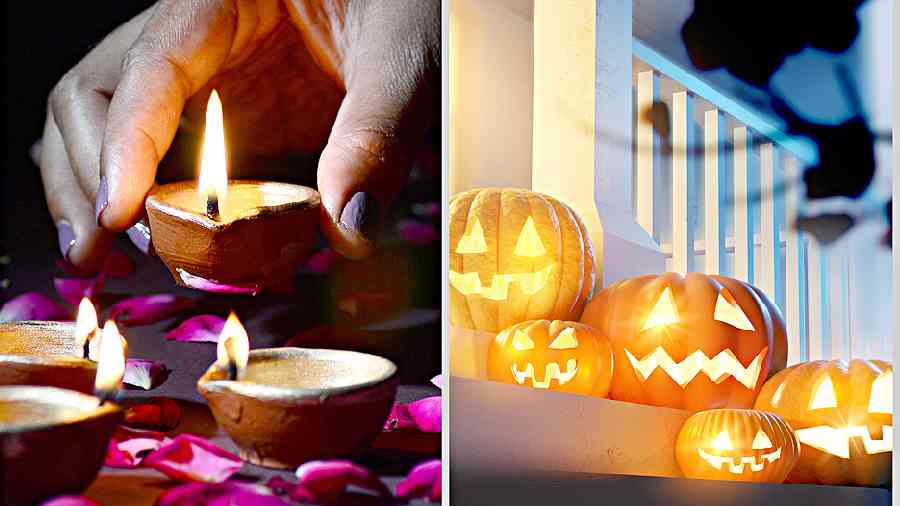Similar spots
Sir — Long before Halloween gained popularity in India, Bengalis were celebrating Bhoot Chaturdashi on the eve of Kali Puja. While Halloween customs include wearing garish costumes as well as carving and decorating pumpkins, Bhoot Chaturdashi is marked by lighting 14 earthen lamps and consuming 14 types of shaak. In spite of the obvious cultural differences, both festivals revolve around honouring the dead and warding off evil spirits. However, Bhoot Chaturdashi struggles to find relevance while Halloween has been made popular by the media. Children must be educated about indigenous festivals.
Sourjo Mondal, Howrah
Stop the hate
Sir — The Supreme Court has expressed concern about the growing incidents of hate speeches in India and directed the police administrations of Delhi, Uttarakhand and Uttar Pradesh to promptly register criminal cases against perpetrators without waiting for formal complaints (“Hate hits home hard”, Oct 22). Several politicians, including those from the ruling Bharatiya Janata Party, have been accused of making incendiary statements that disrupted religious harmony. The top court rightly said that the spreading of hatred endangers the values of secularism and fraternity envisioned in the Constitution (“Clear call”, Oct 27). It also warned of contempt action if the police showed any hesitation in compliance. There has been a dearth of punitive action against hate mongers. The Supreme Court’s intervention is thus welcome.
Khokan Das, Calcutta
Sir — Speeches inciting hatred against the minority community have become commonplace in India. This has coincided with the BJP’s ascendence to power — the inflammatory speeches made at the Haridwar Dharma Sansad and by Nupur Sharma against Prophet Mohammed are some recent examples of this. The continuous dissemination of hatred has resulted in a rise in atrocities against religious minorities. The silence of the ruling dispensation suggests tacit support for such hate-mongering.
Ranganathan Sivakumar, Chennai
Bridge the gap
Sir — Ever since the Supreme Court struck down the Narendra Modi government’s efforts to introduce the national judicial appointments commission bill — it aimed to regulate the appointment and transfer of judges — as unconstitutional, the differences between the executive and the judiciary have increased. The Union government has been cherry-picking the Supreme Court collegium’s recommendations in an attempt to subvert judicial authority. This is clear from the delay in elevating the chief justice of the Bombay High Court, Dipankar Dutta, to the top court and in appointing the chief justice of the Orissa High Court, S. Muralidhar, as the chief justice of the Madras High Court (“Worry over delay on two judges”, Oct 26). Muralidhar’s tough stance against the Centre for the latter’s inaction during the 2020 Delhi riots could be the reason behind the delay. Attempts to slow down judicial appointments will increase the backlog of cases.
S.S. Paul, Nadia
Vindictive step
Sir — It is unfortunate that the Kashmiri journalist, Sanna Irshad Mattoo, was not allowed to travel to the United States of America to attend the Pulitzer Prize ceremony in spite of possessing valid travel documents (“Clipped wings”, Oct 25). Mattoo was awarded the Pulitzer Prize for covering the devastation during the second wave of Covid-19 in India. She is not the only one to incur the wrath of the regime. Rana Ayyub, Aakar Patel and other critics have been repeatedly harassed by the ruling regime too.
Jahar Saha, Calcutta
Sir — Sanna Irshad Mattoo has been stopped from flying out of India for the second time. It is a matter of great shame that India is not taking pride in her achievements.
Roshan Kapoor, Calcutta
Travel woes
Sir — In his article, “City sans wheels” (Oct 25), Ruchir Joshi describes his nightmarish experience of commuting from the Calcutta airport. Conveyance from the airport has indeed become cumbersome. Cabs are not available and even when they are, the costs of travel are exorbitant. This is disconcerting. Flyers travelling to the city must have access to adequate transport services.
Suman Chakraborty, Bengaluru
Bleak future
Sir — Many engineering graduates have been left in the lurch even after getting job offers during campus placements as several information technology firms have either revoked their offer letters or are delaying induction. The global economic slowdown and inflationary pressures have cast a shadow over employment opportunities. The high rate of attrition in the IT sector is also a cause for concern. The government should safeguard the prospects of the students.
M. Jeyaram, Sholavandan, Tamil Nadu










